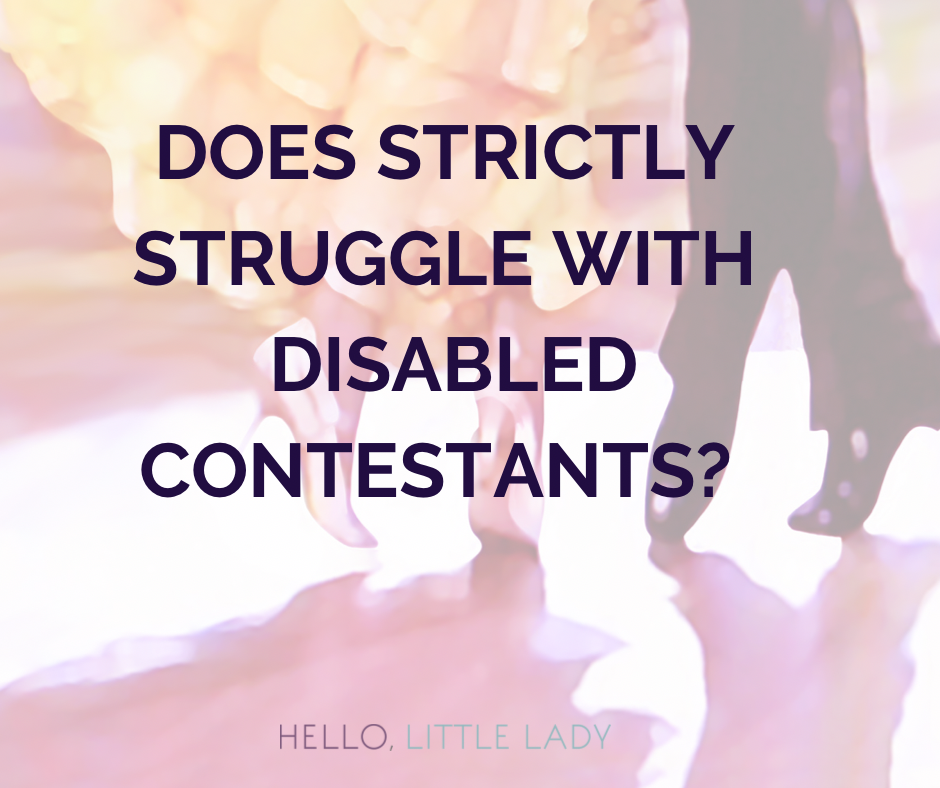As a disabled person, you have to wonder if BBC Strictly Come Dancing, despite its best efforts, is an inherently ableist show.
Strictly has been on our TV screens for two decades and, thankfully, we are increasingly seeing a more diverse set of contestants.
Yet having watched the show each season for the past 6 years or so, I have been wondering if the show struggles with contestants that, in particular, are physically disabled.
From Johnnie Peacock MBE to Lauren Steadman, and now Ellie Simmonds MBE, have been eliminated in the dance-off. Are they, inherently, at a disadvantage because of their disability?
What Strictly did well
I was absolutely thrilled to hear that Ellie Simmonds was joining back in August this year. The 5 times gold medal Paralympian was the perfect representative from the Dwarfism community for the show.
It was thrilling to hear that the Dwarfism community would at last have a genuine positive representation on a mainstream prime time TV show.
The significance of this representation to wider society is fantastic. Yet the confidence boost to the community – to see someone with Dwarfism having the opportunity to wear glitter and sparkles and shimmy across the dance floor week after week, has been priceless.
From my own 4ft 4” perspective, it was wonderful to see Ellie being partnered with an average height pro, despite the trolling she received wondering how the dances would work. Some may argue that Ellie should have had a Dwarf pro dancer. I disagree. I wish I had had this representation before I did my first dance at my wedding and I may have not felt so awkward.
Where Strictly didn’t do so well?
Yet the first episode left some of us with an uneasy feeling watching Nikita bending over her while trying to dance. While postures improved, this first dance reminded me of being in photographs with average-height people who tend to bend down to be at the same height, which is unnecessary and infantilising.
From then on, there seemed to be a timidity within some of the dances and promos.
I couldn’t figure out if it was because the dances were physically too much, that there was a pain issue going on or the show was genuinely unsure of how to adapt the dances or work with the height difference.
In terms of Ellie’s experience, you could see that Ellie was struggling in some of the dances and it looks like a massive floor space to cover. From a Dwarfism perspective, we could see the double amount of steps or effort needed. It seemed only her dance partner, Nikita, attempted to make people aware of this.
So does BBC Strictly struggle with disabled contestants?
For all the perceived rights and wrongs, and observations of Ellie’s Strictly journey (and other disabled contestants who have participated over the last few years) – we have to remember it’s a popularity dance contest that thrills and entertains millions of us each week as the winter nights draws in.
Strictly’s strength is that it is THE mainstream show that genuinely platforms people from all walks of life. We are all richer for this – regardless of what a certain Telegraph columnist says. The show at least attempts to reflect who makes up our wonderfully diverse country – despite the cries of wokeism it increasingly faces.
So does Strictly struggle with disabled contestants?
Some people will probably argue no, especially with Rose’s win last year. Yet, to a degree, I would say yes, but more in a practical sense that is much more nuanced. The show provides the opportunity to learn about what worked and what did not. I am guessing it’s a learning curve for all involved.
Strictly shows how people with different abilities can enjoy and should have the opportunity to dance and perform. Personally, I am glad that we have a show and an organisation that isn’t afraid to try.
Despite some difficulties the show encounters, this should not diminish nor detract from the overall effort, inclusion and positive effects on representation that Strictly offers. At its heart, Strictly’s main strength is its inclusiveness.
Strictly shines a light on a much wider conversation that is needed about disability
In an increasingly divisive world, the show reflects back to the audience the conversations we need to be having, as a society, about various disabilities.
Rather than being worried if disabled contestants are at a disadvantage on the Strictly, what we can reflect on is how the show highlights perfectly the tension between inclusion and existing in an ableist society.
What Strictly does, is provide the perfect opportunity to reflect on this and develop a wider and richer conversation around disability, and specifically, Dwarfism.
Primarily, what Ellie’s inclusion in the show points to is the need to platform the lived experiences of Dwarfism that is missing from our screens more than ever.
Stories that show our experiences of adapting to the non-disabled world on our terms or at least with equity. Stories that aren’t boxed into either victim or inspiration figures. Stories that show the prejudice and ignorance faced daily for the way you are born and who continue to be singled out by comedians mocking our disability.
Each piece of positive representation helps, and as Ellie shimmy’s out of the ballroom, all that is left to say is – Bravo Ellie and well done, the BBC.
The Dwarfism community feels seen.

